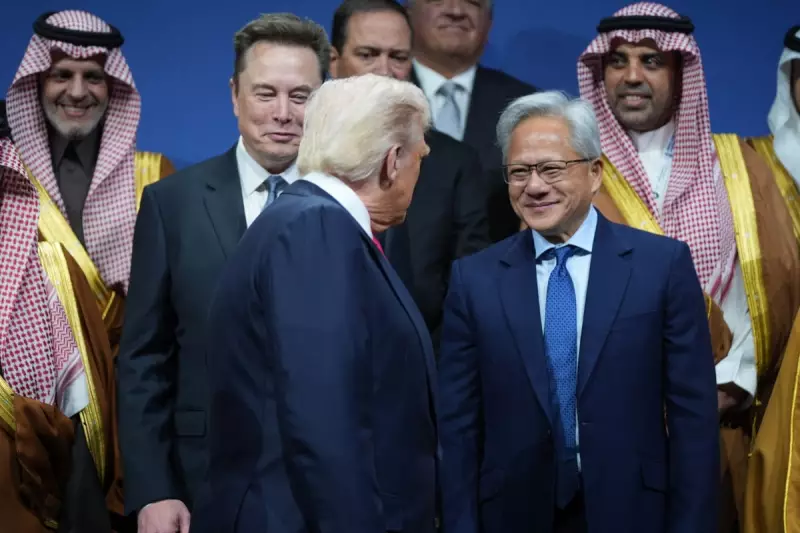
Trump's AI-Focused Economic Strategy Takes Centre Stage
President Donald Trump is increasingly relying on the technology sector and artificial intelligence development to fulfil his economic promises, a strategic emphasis that became particularly evident during Saudi Crown Prince Mohammed bin Salman's recent visit to the United States.
The Saudi leader has pledged an enormous $1 trillion investment with American companies, primarily focused on utilising Saudi Arabia's substantial oil and natural gas reserves to transform the nation into a global hub for AI data infrastructure.
High-Profile Tech Summit Demonstrates AI Commitment
During Wednesday's US-Saudi Investment Forum at the Kennedy Center, Trump declared: "We will work closely with friends and partners like those in this room to build the largest, most powerful, most innovative AI ecosystem in the world."
The event attracted significant tech industry leadership, with Nvidia co-founder Jensen Huang and tech billionaire Elon Musk occupying prominent front-row seats, underscoring the sector's crucial role in this economic vision.
Trump has enthusiastically claimed responsibility for both the new investments and this year's stock market performance, attributing them largely to the ongoing artificial intelligence infrastructure expansion. Despite his assertions that tariffs drive new investments, much foreign capital is actually flowing toward data centres required for AI computing demands and the power facilities needed to operate them.
Economic Risks and Market Uncertainties
While the president described stock market gains as "amazing," leading indices experienced declines on Tuesday amid growing concerns that AI companies might be inflating a broader financial bubble.
Political risks also loom for Trump if the AI expansion drives utility prices higher for American consumers or if the promised employment opportunities in the sector fail to materialise.
Consultancy Oxford Economics released analysis on Tuesday indicating that AI investments have partially offset the "extreme uncertainty" in the US economy this year—uncertainty partly created by Trump's tariff increases that have elevated inflation and potentially contributed to slowed hiring.
The firm also noted that AI companies are beginning to rely on debt to finance sector growth, potentially signalling "a more vulnerable phase" for the boom next year.
Saudi Arabia's Escalating AI Investment Commitment
The intensifying race for AI investment is clearly demonstrated by Saudi Arabia's escalating commitments, which increased from $600 billion during Trump's May visit to the kingdom to the current $1 trillion pledge during Prince Mohammed's White House visit on Tuesday.
Trump revealed he's already pressing for even greater investment, disclosing that he lobbied the Saudi leader backstage before their public appearance: "While we were taking the picture, I said, 'Could you make it $1.5 trillion?' So he's got something to think about."
When Blackstone Group CEO Stephen Schwarzman was asked about the most significant growth stories at the summit, the billionaire investor identified "AI and, you know, power" as the dominant themes. "Those are the two things that we spend a lot of time on," Schwarzman stated. "At Blackstone, my company, we're the largest developer, the largest owner, of data centres in the world. And this is a really explosive area."
Industry Leaders Voice Confidence and Caution
Tareq Amin, CEO of Saudi-backed AI company Humain, explained that his company launched when Trump visited the Middle Eastern nation in May. His firm identified opportunities to construct data centres and AI infrastructure by combining Saudi Arabia's energy production with American technology. "Yes, it is an ambitious, crazy thing," Amin stated confidently.
Elon Musk, whose xAI company developed the Grok chatbot, predicted that AI and robots would eventually make work optional for humans, rendering money "irrelevant" and eliminating poverty entirely. "AI and humanoid robots will actually eliminate poverty," said the Tesla and SpaceX leader. "Robots will make everyone wealthy."
Nvidia's Jensen Huang, appearing alongside Musk, offered a more measured perspective: "Everybody's jobs will be different. I think that that's for sure." Huang spoke ahead of the $4.5 trillion computer chip company announcing its quarterly earnings on Wednesday.
During his remarks, Trump directly questioned Huang about whether any nation could compete with Nvidia's Blackwell chip, which enables much current AI development. From his front-row seat, Huang responded: "Not yet, sir."





